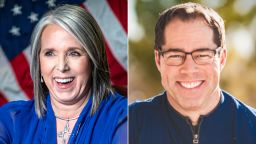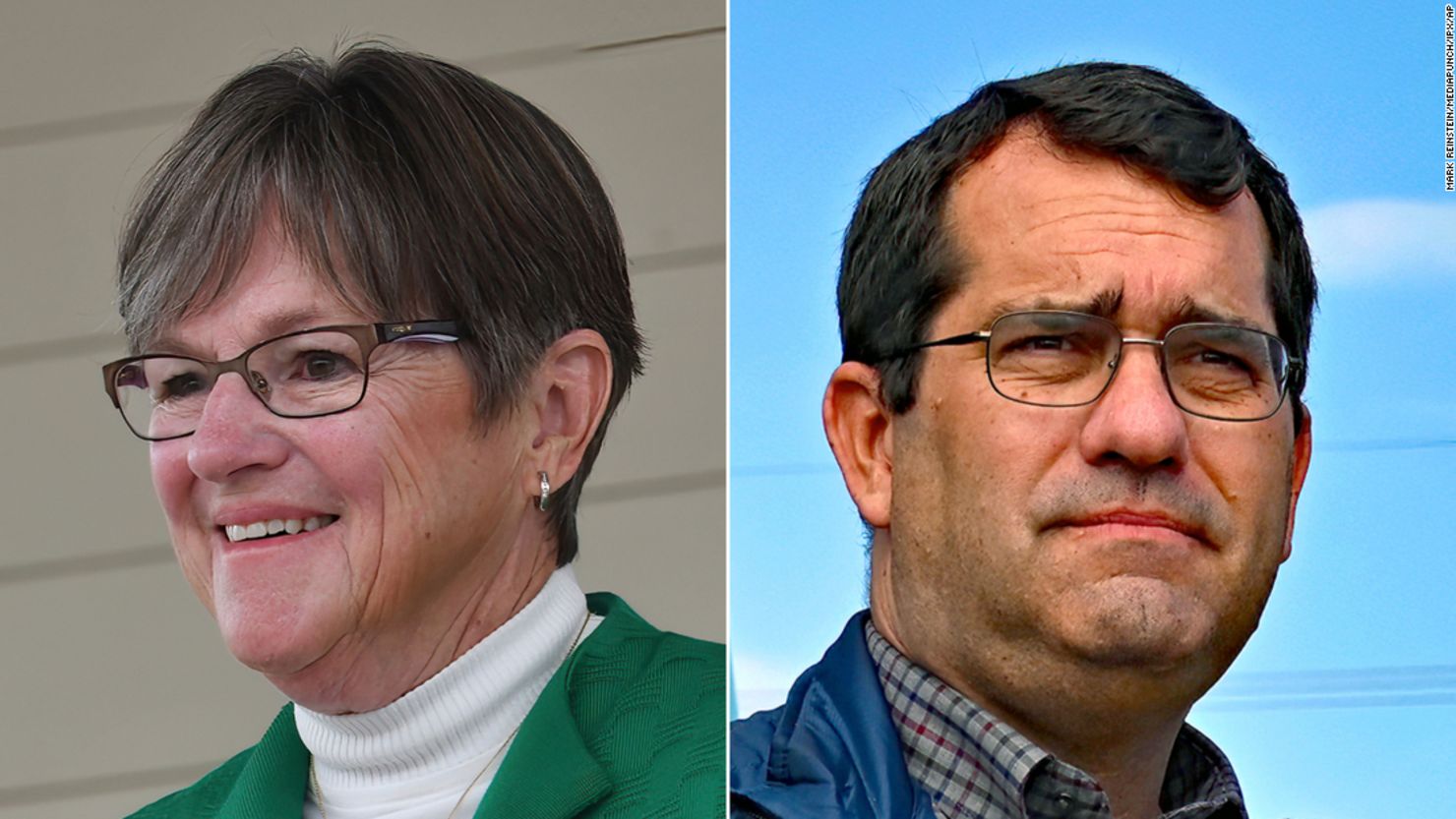Democratic nominees for governor are facing the stiffest competition this year as the party tries to hold on to its gains from the “blue wave” of 2018, even though Republicans are defending more governorships in November.
Democrats hold 16 of the 36 gubernatorial seats on the ballot, including in key states like Arizona, Pennsylvania and Michigan. Events of the past two years have brought to the fore the power of governors, who have played decisive roles in dealing with the Covid-19 pandemic, the aftermath of former President Donald Trump’s defeat in 2020 and new clashes over the future of abortion rights following the US Supreme Court’s decision to overturn Roe v. Wade.
Gubernatorial races are on the ballot in the five states that flipped from Trump in 2016 to now-President Joe Biden four years later. Those contests, all but one of which feature Trump-backed GOP nominees will test of the strength of the former President’s movement and his ability to boost his picks in a general election.
Meanwhile, Republican incumbents in states such as Florida and Texas could be using their reelection campaigns as possible jumping-off points for future presidential bids.
The 2022 races are also expected to mark the end of an era in states such as Maryland and Massachusetts, where two-term moderate Republican governors are on their way out – one via term limits, the other facing dissent within his own party – with Democrats poised to replace them.
As the campaign hits the home stretch, these are the 10 states – eight where Democrats currently hold the governorship – with the most consequential contests on the ballot.
Arizona

The Grand Canyon State became ground zero for Trump’s 2020 election conspiracy theories after voters there narrowly backed Biden and Trump-aligned state lawmakers later forced a deeply flawed partisan ballot review in Maricopa County that ultimately did not alter the outcome.
But that controversy has lingered, with Republican gubernatorial nominee Kari Lake echoing Trump’s falsehoods that the 2020 election was “corrupt” and “stolen.” She has also stated that she would not have certified the 2020 election results in Arizona. Lake’s Democratic opponent, Arizona Secretary of State Katie Hobbs, who defended the state’s election systems against the baseless fraud accusations, has cast the former news anchor as a dangerous threat to democracy.
Lake is focusing on her economic agenda in the campaign’s final weeks and on her plans to address increased migration across the border – including a promise to declare an “invasion” at the border to give the state greater power to address the issue. She also has accused Hobbs of cowardice for refusing to debate her. Hobbs has centered her campaign on abortion, arguing that her GOP opponent’s extreme positions would endanger Arizona women.
The Hobbs-Lake race is one of five gubernatorial contests this cycle in which both major-party nominees are women. Up until this year, there had only been four such matchups in US history.
Kansas

Democrat Laura Kelly seized on voter antipathy for state and national Republicans in 2018 to become governor of reliably red Kansas. Four years later, it may be anger aimed at her own party that dooms her reelection bid.
Kelly faces Republican state Attorney General Derek Schmidt in a state Trump won by 15 points in 2020. Schmidt has not impressed party officials with his campaign or his fundraising – Kelly raised over $1.5 million from January to July, while her GOP opponent only brought in around $700,000 in that time frame. But Republicans are hopeful that Schmidt will benefit from the state’s natural political tilt, which they’re seizing on by tying Kelly to Biden at every turn.
Democrats got a boost this summer when a turnout surge helped defeat a ballot measure that would have allowed lawmakers to ban abortion in the state. The victory – with the “no” vote carrying nearly 60% of the vote – invigorated Kansas Democrats and seemingly Kelly’s reelection chances.
But Kelly has not exactly seized on abortion as an issue in her bid for a second term. On the campaign trail, she has largely focused on speaking about the economy, education and tax cuts, three more palatable issues for the independent and Republican-leaning voters she will need to defeat Schmidt.
Nevada

Democratic Gov. Steve Sisolak faces fierce headwinds in a state that has seen some of the nation’s highest inflation rates as well as frustration among blue-collar workers about the pace of the post-pandemic recovery. Many Nevadans in the tourism-reliant state were hit hard by pandemic-era closures and are now grappling with the high cost of gas and groceries.
Sisolak’s opponent, Clark County Sheriff Joe Lombardo, has the backing of both the GOP establishment and Trump, though the Republican nominee has said he does not agree with the former President’s false claim that the 2020 election was rigged. Lombardo has focused on kitchen table issues, including education and the expansion of school choice. He has blamed Biden and the Democrats for inflation – and accused the governor of hampering the economic recovery by being overly restrictive with school and business closures during the pandemic.
Sisolak has defended his actions as necessary to save lives, but he has also attempted to distance himself from the unpopular President. The Democrat has also pounded Lombardo for a series of inconsistent statements on abortion, which is protected up to 24 weeks under Nevada law.
Sisolak has faulted his opponent for an uptick in crime in Clark County, home to Las Vegas. At a recent debate, Lombardo said that crime went down for six years of his tenure as sheriff but acknowledged it has increased in the past two years – which he blamed on “soft on crime” policies advanced by the governor and Democratic lawmakers.
Oregon

An unpredictably close race between three well-funded women could culminate in Oregon electing its first Republican governor in 40 years.
Democrat Tina Kotek, the longest-serving state House Speaker in Oregon history, started out as the favorite to replace term-limited Gov. Kate Brown in the blue-leaning state. But independent candidate Betsy Johnson has proved to be a formidable contender who Democrats fear could act as a spoiler in the race. A former Democratic state senator with two decades of legislative experience, Johnson has powerful allies in the business community who have made it possible for her to outraise her opponents. Johnson – a gun rights advocate who relishes the fact that she is being attacked by the “woke left” and the “radical right” – has blamed liberal Democratic policies for trash-lined streets and tent cities, as the state struggles with homelessness.
Johnson’s candidacy has created a path for Republican Christine Drazan, the former state House minority leader, who is promising to bring “balance” back to Oregon while charging that all-Democratic control over the past decade has failed to hold the governor and the Legislature “to account.”
Biden made a recent foray to the state to offer Kotek a fundraising assist.
Wisconsin

Gov. Tony Evers’ bid for reelection in one of the nation’s most competitive states could hinge on what’s most important to voters: abortion rights, which the Democrat has made his top focus in recent weeks, or the economy, which could benefit his Republican challenger, businessman Tim Michels.
Evers recently called the state’s GOP-led legislature into a special session, urging lawmakers to allow a Michigan-style referendum to undo the state’s 1849 law that bans abortion in all cases except to save the life of the mother. But Republicans gaveled in and out of session within 30 seconds, ignoring Evers’ calls.
Michels, who won the GOP nomination in August buoyed by a Trump endorsement, has focused his campaign on crime and inflation. Republicans are blaming Evers for a 70% increase in homicides in Wisconsin from 2019 to 2021, and Michels has also criticized the governor’s push to cut the state’s prison population.
Wisconsin’s elections have long been hard-fought: Biden defeated Trump there by about 20,000 votes out of more than 3.2 million cast in 2020, four years after Trump carried the state by a similar margin. Evers narrowly unseated GOP Gov. Scott Walker in 2018 but he faces a decidedly different political climate this year. As does his No. 2, Lt. Gov. Mandela Barnes, who is challenging Republican Sen. Ron Johnson in one of the nation’s most competitive and expensive contests.
Michigan

Democratic Gov. Gretchen Whitmer has made her support for abortion rights the centerpiece of her bid for a second term against Republican Tudor Dixon, a conservative commentator.
Whitmer has positioned herself as the last line of defense for abortion rights in the state. She sued to block Michigan’s 1931 ban from taking effect after the Supreme Court eliminated federal abortion rights protections in June. She is also backing a Michigan ballot measure that would enshrine abortion rights in the state’s constitution.
Dixon won a wide-open GOP primary in August, benefiting from the financial backing of the family of former Education Secretary Betsy DeVos and a late endorsement from Trump. She has embraced Trump’s lies about fraud in the 2020 election.
In recent weeks, Dixon has sought to shift the focus of the race from abortion to other cultural issues. She has proposed a measure that would ban transgender girls from competing in sports with the gender they identify with, as well as one modeled after a Florida law, which critics have dubbed “Don’t Say Gay,” that bans discussion of gender and sexuality issues with younger students in classrooms.
Dixon has also made implicit acknowledgements that the electorate is more closely aligned with Whitmer’s position on abortion.
“You can vote for Gretchen Whitmer’s position without having to vote for Gretchen Whitmer again,” she told reporters recently, citing the abortion ballot measure.
New Mexico

On paper, the New Mexico governor’s race should not be competitive: Biden carried the state by double digits in 2020.
But if there is a red wave, Republicans hope former television meteorologist Mark Ronchetti may be able to unseat incumbent Democratic Gov. Michelle Lujan Grisham, a former congresswoman seeking her second term in office.
Ronchetti has beaten expectations before. In 2020, as the GOP nominee for Senate, he outran Trump at the top of the ticket, losing by a closer-than-expected 6 points to Democrat Ben Ray Lujan (a distant relative of the governor).
In his bid for governor, Ronchetti has attempted to distance himself from the former President – including by acknowledging that Biden won the 2020 election. He won a five-way GOP primary in June, finishing comfortably ahead of an opponent who had questioned his Republican credentials.
Ronchetti’s campaign has focused on crime – including one ad that a CNN fact check determined was deceptive – and the decision to stop in-person schooling during the coronavirus pandemic. Lujan Grisham has cast herself as someone who has had to make tough decisions while panning her opponent’s lack of political experience. These contours of the race were clear in their first debate last month.
“There has to be a change here — she hasn’t taken crime seriously,” Ronchetti said during the debate.
“Bold words from someone who’s never even been to a legislative session,” Lujan Grisham responded.
Pennsylvania

Less than a month before the election, Democratic state Attorney General Josh Shapiro is enjoying a big lead in the polls – and in fundraising – over Republican state Sen. Doug Mastriano, a hard-line conservative who led GOP efforts to overturn Biden’s 2020 victory in the commonwealth.
Shapiro is a popular figure who, should he win as expected in November, will be on the radar of national Democrats thinking ahead to the party’s next open presidential primary. Until then, though, his focus will be on defeating Mastriano, who is supported by Trump and chartered buses to Washington ahead of the former President’s “Stop the Steal” rally on January 6, 2021. (Mastriano says he never entered the US Capitol and has not been charged with any crimes.)
Like a handful of other contests on this list, Pennsylvania is particularly important to Democrats because the state legislature is controlled by Republicans. And with abortion rights now resting with the states, a GOP governing trifecta could move forward with a ban or severe restrictions on the procedure. Mastriano has said he favors a total ban, with no exceptions.
Abortion is currently legal in Pennsylvania, up to 24 weeks into a pregnancy, a standard Shapiro has vowed to support and uphold.
Georgia

Republican Gov. Brian Kemp faces Democrat Stacey Abrams in a rematch of their showdown four years ago. While the race remains competitive, Kemp finds himself in a better position than 2018, when Abrams lost by about 54,000 votes out of nearly 4 million cast.
Coming after nearly two decades of GOP dominance in Georgia, Kemp’s slim victory was a sign that the state was up for grabs. Two years later, Georgia narrowly voted blue in the presidential election for the first time since 1992 while Democrats flipped both US Senate seats in runoffs, in no small part due to Abrams’s efforts to organize and mobilize minority and progressive voters in the Peach State.
Kemp drew Trump’s ire in 2020 when he rebuffed his efforts to overturn Biden’s victory in Georgia. But that stance earned Kemp an independent reputation, aided by a Trump-backed primary challenge that failed to take him down. Kemp remains a reliable conservative and has not shied away from helping enact Republican agenda items, including a far-reaching new elections overhaul and a six-week abortion ban that went into effect with the overturning of Roe v. Wade.
Abrams, meanwhile, is attempting to use her organizational and financial advantages – she has outraised Kemp, thanks to a national donor network – to draw attention to the governor’s most conservative positions, from restricting abortion to opposing Medicaid expansion. But she has struggled to recapture the magic from four years earlier and has consistently run behind Democratic Sen. Raphael Warnock, who is seeking a full six-year term against embattled Republican challenger Herschel Walker.
Florida

Before he can decide whether to run for president, Gov. Ron DeSantis first faces a reelection test back home.
Those close to the Republican governor say he is looking to better Trump’s 3.5-point victory two years ago in Florida – a symbolic result that would signal DeSantis’ readiness to potentially compete with the former President for the party’s 2024 nomination.
Standing in the way is Charlie Crist, the former Republican governor and Democratic congressman whom Democrats have turned to once again try to take down a GOP incumbent. Democrats are not only hoping to slow DeSantis’ rise; they’re desperate to prove that Florida remains a swing state. Crist, though, has been hampered by sluggish fundraising and overall Democratic malaise in the Sunshine State, while DeSantis has broken campaign financing records as he taps into Republican excitement around his political stardom.
Crist’s uphill climb was made that much harder by Hurricane Ian, a colossal and deadly storm that forced politics to the back burner as Floridians and their elected leaders – including DeSantis – dealt with the aftermath. Both candidates are reemerging on the campaign trail, but Crist lost several weeks when he could ill afford to.
Other states
It could be back to the future in Maine and Alaska, with two former governors, Republican Paul LePage and independent Bill Walker, respectively looking to unseat incumbents Janet Mills, a Democrat, and Mike Dunleavy, a Republican. The Alaska race will, for the first time, be decided by a ranked-choice vote. Maine, one of the pioneers of that voting system, does not use it in general elections for governor, so the winner only needs a plurality for victory.
There isn’t much drama around the electoral outcomes in the blue states of Massachusetts, Maryland and New York. The GOP nominees are all closely aligned with Trump – a good formula for winning a primary, but likely a losing proposition in a general election.
In New York, Republicans’ two-decade-long statewide losing streak – the longest in the country – appears poised to continue, with Democratic Gov. Kathy Hochul, who ascended to the top job following Andrew Cuomo’s resignation last year, favored over US Rep. Lee Zeldin.
In Maryland, state Del. Dan Cox won the GOP nomination over a candidate endorsed by term-limited Republican Gov. Larry Hogan. He’s floundered since, with Democrat Wes Moore poised to make history as the state’s first Black governor. It’s a similar story in Massachusetts, where popular GOP Gov. Charlie Baker decided against a run for a third term amid backlash from conservative Republicans, who ended up nominating former state Rep. Geoff Diehl. State Attorney General Maura Healey, who would make history as the commonwealth’s first elected female governor and the first out lesbian governor in the US, is the overwhelming favorite to reclaim the corner office for Democrats.
Another woman with a chance to make history in November is Arkansas Republican Sarah Huckabee Sanders, a former press secretary in the Trump White House and daughter of former Gov. Mike Huckabee. Sanders is heavily favored to become the first female governor of the deep-red state.
There are also a handful of states that, while their results might not be in much doubt, incumbent governors, like DeSantis in Florida, will be keeping a close eye on their margins of victory as they look ahead to potential presidential bids, in 2024 or beyond.
In Texas, Republican Gov. Greg Abbott is in a contentious race with Democrat Beto O’Rourke. The former El Paso congressman hasn’t caught fire like he did in his near-miss 2018 Senate run but remains an estimable opponent. A big win for Abbott could stoke his ambitions. The same could go for GOP Govs. Chris Sununu of New Hampshire and Kristi Noem of South Dakota, who may be facing a closer-than-expected reelection race but remains favored in a state that last elected a Democratic governor in 1974.
Among Democrats, Govs. Gavin Newsom of California, Jared Polis of Colorado and J.B. Pritzker of Illinois could all seek to use successful reelection bids next month as a springboard to higher office.






